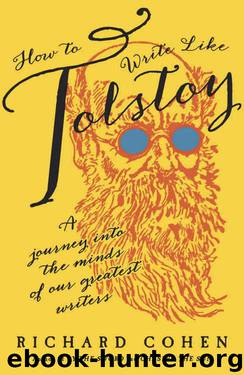How to Write Like Tolstoy: A Journey into the Minds of Our Greatest Writers by Richard Cohen

Author:Richard Cohen [Cohen, Richard]
Language: eng
Format: epub
ISBN: 9780812998306
Publisher: Random House Publishing Group
Published: 2016-05-17T04:00:00+00:00
* * *
*1 When concerns were expressed about over-subtlety in Pride and Prejudice, Jane Austen twitted: “I do not write for such dull elves/As have not a great deal of ingenuity themselves.” And George Eliot produced her own ironic comment at her fellow author’s expense in Daniel Deronda: “Some readers of this history,” she writes in assumed innocence, “will doubtless regard it as incredible that people should construct matrimonial prospects on the mere report that a bachelor of good fortune and possibilities was coming within reach, and will reject the statement as a mere outflow of gall” (Collins Cleartype edition, date unknown, p. 120).
*2 “For a long time no one could find a source for “sardonic” in any Indo-European-based language. Sardanios is the original Greek word, but whence did it come? Then someone pointed out that in Sardinia there’s a local plant which if you eat it you die—but with a strange, mocking look on your face.
*3 In The New Science of 1725, the Italian philosopher Giambattista Vico argued that there were just four main figures of speech: metaphor, metonymy (in which a word or concept is called not by its own name but by something associated in meaning with it), synecdoche (a substitute for representation, in which a term for a part of something refers to the whole), and irony. Together these made up all “necessary modes of expression.” Among the many influenced by his work were Karl Marx and Samuel Beckett.
*4 Freud named this effect the unheimlich, or uncanny, which he defined as “in reality nothing new or foreign, but something familiar and old-established in the mind that has been estranged only by the process of repression.” The German word Heim means “home”; the uncanny is “what was once…homelike” but now feels strange or mystifying.
*5 Would Kafka have finished The Castle had he not died of tuberculosis? In a 1922 letter to Max Brod, he says that he is giving up on the story. But Kafka also told Brod on multiple occasions that the ending would involve K. living and eventually dying in the village, culminating on K.’s deathbed as he receives a notice from the castle that his “legal claim to live in the village was not valid, yet, taking certain auxiliary circumstances into account, he was permitted to live and work there.” Ironically, the ending we have may be the more resonant.
*6 My Kingston colleague, the novelist and poet Vesna Goldsworthy, has taken to asking her students to write the “missing episode” from “Bananafish.” Incidentally, the story made Salinger’s reputation—The New Yorker immediately gave him an extended contract; Brigitte Bardot tried to buy the film rights (he almost accepted).
Download
This site does not store any files on its server. We only index and link to content provided by other sites. Please contact the content providers to delete copyright contents if any and email us, we'll remove relevant links or contents immediately.
| Booksellers & Bookselling | General |
| History of Books |
4 3 2 1: A Novel by Paul Auster(12333)
The handmaid's tale by Margaret Atwood(7711)
Giovanni's Room by James Baldwin(7256)
Asking the Right Questions: A Guide to Critical Thinking by M. Neil Browne & Stuart M. Keeley(5712)
Big Magic: Creative Living Beyond Fear by Elizabeth Gilbert(5682)
Ego Is the Enemy by Ryan Holiday(5351)
The Body: A Guide for Occupants by Bill Bryson(5034)
On Writing A Memoir of the Craft by Stephen King(4893)
Ken Follett - World without end by Ken Follett(4688)
Adulting by Kelly Williams Brown(4536)
Bluets by Maggie Nelson(4515)
Eat That Frog! by Brian Tracy(4484)
Guilty Pleasures by Laurell K Hamilton(4395)
The Poetry of Pablo Neruda by Pablo Neruda(4068)
Alive: The Story of the Andes Survivors by Piers Paul Read(3999)
White Noise - A Novel by Don DeLillo(3982)
Fingerprints of the Gods by Graham Hancock(3966)
The Book of Joy by Dalai Lama(3947)
The Bookshop by Penelope Fitzgerald(3812)
